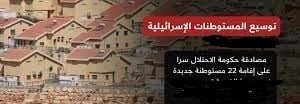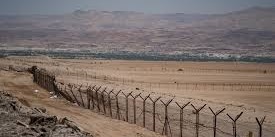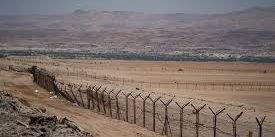By: Madeeha Al-A’raj
The National Bureau for Defending the Land and Resisting Settlements stated in its latest weekly report , that last July, the Israeli army announced the appointment of 5 brigadier generals to its General Staff, including Major General Avi Balut as commander of the Central Military District i.e. West Bank, succeeding Yehuda Fuchs, who has retired, amidst great tension in relations between the settlers and him, to the point that Israeli intelligence had placed guards accompanying Fuchs out of fear for his life. This came as part of the transfer of powers to manage settlers’ lives, planning and construction in Area C from the Army’s Central Command to civilian ministries, and after the Israeli police, under the leadership of Minister Ben Gvir, don’t impose security in large areas of the West Bank.
Furthermore, allowed armed settlers to carry out terrorist acts, which led to a conflict of powers between the Central Command and the civilian ministries controlled by the settlers. It is true that Balut does not officially belong to Religious Zionism, but in his ideology he is a son of the new Zionism with its extreme right-wing tendencies. He is a settler, like Ben Gvir, Smotrich and many others.
Noting that Avi Balut was born in Jerusalem and studied at the ‘pre-military service’ preparatory school in the Eli settlement, halfway between the cities of Nablus and Ramallah, which is one of the most extremist settlements, and where Smotrich also studied. Balut enlisted in the Israeli occupation army in 1994 at the age of 18. During his military career, he rose to the rank of colonel and commander of the Judea Brigade in 2012 – 2014, a brigade operating within the Central Command of the army and stationed in the West Bank. Then in 2021, Balut assumed command of the ‘Judea and Samaria’ Division, which is responsible for all military operations in the West Bank.
During his tenure, Israel launched Operation ‘Break the Waves’, as part of the operation, the number of battalions under his command doubled to 22 battalions. He sought to turn the West Bank into a real battlefield after adopting a violent offensive approach towards the Palestinians. Balut, who wears a kippah ‘a religious Jewish skullcap)’ is a supporter of settlements and is close to settler leaders. Balut’s first act in his new position was to sign a military order aimed at preventing any Palestinian construction and demolishing any structures built without permits in the nature reserve area near the Gush Etzion settlement bloc. Ministers and members of Knesset from the extreme right, including Smotrich, described this step as the most important in the history of Israeli settlements, and a clear withdrawal from the Oslo Accords.
This Central Command commander is the originator of the Zionist term ‘land redemption’, which means seizing Palestinian land through more settlements and outposts. He had distributed to the brigade commanders in the West Bank Division of the occupation army a book by Lior Zeberg, a person known in the settlements for encouraging the seizure of Palestinian land and strengthening ‘elements of a sense of security in the settlements’, entitled ‘For Us in the Taboo: Secrets of the Land Redeemers from Our Father Abraham to the Youth Settlement.’
In the dedication, Balut wrote, ‘Dear commanders, in order to carry out the defense mission in Judea and Samaria, there is a need to establish many cooperative procedures and for you to be professionals and possess knowledge in many fields in addition to the military profession. The field of settlement and the status of land is one of the fields that require knowledge in order to make the missions integrated. I hope that the book will help in understanding the subject and in getting to know the various elements associated with it.’
The leaders of “Religious Zionism” and “Jewish Power” are comfortable with these developments and the situation in the ‘Civil Administration’, the police and the ‘Central Command’ and they turn a deaf ear to the criticism that comes from circles in the army and police regarding the practices of the settlers. They do not give weight to the statements and positions of those who differ with them in opinion, such as General Fuks or the reserve general, Amiram Levin, the former deputy head of the Mossad and the former commander of the Northern Command in the occupation army, who said in an interview with the Israeli public radio ‘Kan’ that the Israeli army is complicit in war crimes through the profound transformations taking place in its ranks that are reminiscent of the transformations that took place in Nazi Germany. Levin meant by this the increase in the number of settlers in the Israeli army and the transformation of their leaders into central ministers in the current government.
The statements of General Fox and Reserve General Amiram Levin were shocking and came to open the doors to the status that the settlers have come to occupy in the occupation army, especially after the events that took place in particular in the towns of Hawara, Turmus Ayya, Umm Safa, Barqa, Qasra, and Jit, and a large number of Bedouin and pastoral communities in various governorates, especially in the Jordan Valley and in the areas south of Hebron and others in the past few weeks, from acts of burning of property and seizing the lands of Palestinian citizens by spreading settlement outposts and so-called pastoral settlements and displacing Bedouin communities from their areas.
Those events have begun to indicate the nature of the relationship between these settlers and the occupation army, as it has become clear that the army is functionally subordinate to the General Staff and the so-called Central Command, but in the practical implementation of its missions, it is subject, according to many Israeli estimates, to the settlers and their rabbis due to the large numbers of settlers joining the occupation army and their increasing influence in security agencies that are no longer, as before, subject to the army’s leadership.
Within the context, in a report entitled ‘Real Estate and Religion’, the British magazine The Economist, published an investigation at the end of last August indicating that Jewish settlers have made unprecedented gains from the war in Gaza. They have taken control of land and gained influence in the army, police, and politics. This is easy to notice when crossing St. 60, which runs through the West Bank from north to south. It is decorated with signs written in Hebrew, “The last two apartments in Mitzpe Levona,” “Your next home is Ofra,” and another promising that “your grass will be green,” which you can see from a villa in Tzvim. These are boom times for settlers in Israel, who are gaining land, military influence, and political power.
The magazine comments that the war on Gaza has made them more emboldened. PM Netanyahu’s government relies on parties supported by the settlers to form a coalition in parliament, giving it wide influence after the war increased the creeping influence of the settlers on the army and provided them with a cover to confiscate land in the West Bank. According to the government’s settlement minister, Orit Strook of the Religious Zionism party, the settlers took advantage of everyone’s preoccupation in 2023 with protests against legal reforms and then with the war on Gaza and carried out unprecedented things like a miracle for the settlements. ‘I feel like someone who was waiting at a traffic light and the green lights came on’, Strook added, speaking to settlers in a settlement outpost south of Hebron.
In addition to all this, Jewish religious beliefs permeate the various units of the Israeli army participating in the brutal war on the Gaza Strip. The priestly songs sung by these forces indicate that the idea of ”messianic Zionism” is widespread among them, especially as they raise slogans on the tanks that are advancing to return settlement to ‘Gush Katif’. The transformations in the army with the expansion of the war on Gaza have reflected the competition between the Israeli parties and movements, by employing the religious biblical dimension in order to mobilize and rally the ranks of the Israelis in general and the settlers in particular to join the ranks of the army and participate in the war that the occupation army is waging on the Gaza Strip as well as in the West Bank, according to a recent report issued by the Israeli Media and Democracy Center ‘Shomrim’”
Noting that, the influence of the settler community and their rabbis is increasing due to the settlers’ desire to join the army. Three out of every five towns with the highest recruitment rates into combat units were in the West Bank. Beit El in the Ramallah and al-Bireh Governorate came in first, where 86% of men born in 1991 served in combat units. Efrat in Gush Etzion in the Bethlehem Governorate came in third, where 81% of men born in 1991 joined combat units. The Hebron Hills Regional Council came in fourth, with 78.4%. Ariel in the Salfieet Governorate, which is considered a secular settlement and the Jewishness of its residents is questionable, was one of four towns where the recruitment rate exceeded 90%.
Based on these conditions surrounding the Civil Administration and the Central Command, Finance Minister and Minister of Settlement in the Defense Ministry, Smotrich, said last Saturday that he would soon present a plan he described as a strategy for the government to approve, as part of what he called strengthening settlements in the West Bank and thwarting the establishment of a Palestinian state.
He explained – via the X platform – that their answer ‘must be strengthening settlements and thwarting the establishment of a Palestinian state that endangers our security and existence’, referring to the European countries’ recognition of the State of Palestine earlier and the escalation of resistance operations in the West Bank. The occupation authorities had published plans to build a new settlement in the middle of this month, and he explained that the move comes in response to what he called the actions of the Palestinian leadership in the West Bank and the countries that recognized a Palestinian state, saying, ‘No decision against Israel will stop the expansion of settlements.
We will continue to fight the dangerous idea of a Palestinian state. This is my life’s mission.’ He added that the new settlement is called ‘Nahal Hillitz’ and will be built on an area of 60 dunams, and will be part of the ‘Gush Etzion’ settlements and will link them to Jerusalem, considering this a ‘national mission’.
And to create additional infrastructure that enhances settlement in Jerusalem and its wider surroundings, the Israeli Ministry of Transportation recently announced the opening of two four-lane tunnels for vehicle traffic in occupied Jerusalem, two of which lead to the settlement of ‘Ma’ale Adumim’ and the Dead Sea east of the city, and the other two return in the other direction towards the settlement of ‘Binyamin’ northeast of the city, in completion of the ‘level separation’ project at the French Hill intersection.
According to the ministry’s website, each tunnel is about 1.5 km long, and was implemented by the ‘Moriya’ company affiliated with the occupation municipality in Jerusalem and the Ministry of Transportation. The two new tunnels are added to two other tunnels that were opened in late 2023 and were named ‘Narkis’ near the Junction of Mount Scopus and the settlement of ‘French Hill’, so that they lead to the settlements of ‘Neve Yaakov’ and ‘Pisgat Ze’ev’, and each of them is 700 meters long.
The Israeli Transportation Minister Miri Regev said, ‘Our commitment to the development and prosperity of Jerusalem, the eternal city and capital of Israel, is expressed in many investments. The ministry is working to strengthen the traffic system and connectivity between Jerusalem and its eastern extension, Ma’ale Adumim and Binyamin.’ The ministry’s director general, Moshe Ben Zaken, said, ‘Our office is working to improve the entrances to the capital, Jerusalem to make it easier for the communities that come to Jerusalem every day for all their needs.’ The new tunnels, in addition to the additional tunnel that was recently opened under the city of Beit Jala, south of Jerusalem, will facilitate the movement of some 170,000 settlers from the settlements of ‘Gush Etzion, Ma’ale Adumim, and “Givat Ze’ev to Jerusalem, as ‘Israel plans to annex these settlement blocs to the administrative borders of the Jerusalem municipality’”
List of Israeli Occupation and Settlers’ Assaults over the Last Week Documented by the National Bureau:
Hebron:
- Throwing stones on citizens’ lands and properties in Halhul and Beit Umar, broke their vehicles.
- Attacking residents of ‘Jurat al-Khail’ village east of Sa’ir town and stole 300 sheep. They beat residents, seized their phones, destroyed residential caravans, and damaged water tanks.
- Gathering at the entrance to Idhna town, blocked the road, chanting slogans demanding the deportation of Palestinians and inciting their killing. They also raised slogans and incitement writings calling for more crimes to be committed. Another group gathered near the town of Adh Dhahiriya, blocked the road, and chanted for the killing of Arabs.
- Demolishing a water well belonging to citizen Moh’d Musa Othman Abu Sharkh in the village of Khallet al-Tayaran. They also demolished an agricultural room in the Khallet al-Amad area near the Al-Kassara area east of Hebron city, belonging to citizen Arafat al-Rajabi.
- Uprooting olive trees belonging to ctizen Naim Shahada al-Hamamda in Harbat al-Takhdeen, vandalized the irrigation network, and stole agricultural equipment.
- Attacking the homes of citizens from the al-Azzameh and Burqan families, searched them, destroyed their contents, and stole sums of money from them in the village of Birin, southeast of Hebron.
Bethlehem:
- Attacking citizens’ vehicles with stones, near the Taqu’ town, southeast of Bethlehem, they damaged a number of vehicles.
- Forcing citizen Amjad Zaghloul from the village of Husan to remove the floor of a commercial store that he built in the Al-Shurafa area at the eastern entrance to the village, under the pretext of not having a license.
Ramallah:
- Setting fire to agricultural lands adjacent to citizens’ homes in the village of Burqa, east of Ramallah.
- Uprooting scores of olive seedlings from the land of citizen Hamza Surur, near the Jabal Al-Alam area in the town of Ni’lin, west of Ramallah.
- Torching a number of citizens’ vehicles in the Deir Dibwan town, east of Ramallah, after attacking the Al-Marj area east of the town. Others burned a vehicle belonging to citizen Moh’d Jamil Shoman, and wrote racist slogans on the walls of a house in the Khallet Za’iter area during their attack on the village of Abu Falah, northeast of Ramallah.
Nablus:
- Committing a horrific crime, killing 13-year-old Bana Amjad Bakr, during a joint raid on the village of Qariot on Friday afternoon.
- Seizing the ‘Ain al-Tahta water spring’ in Khirbet Tana, part of Beit Furik lands east of Nablus, and expelled residents from the area.
- Setting fire to olive fields in the village of al-Lubban al-Sharqiya, near the Khan on the old road between Ramallah and Nablus.
- Injuring 4 citizens in the Qosra village, south of Nablus.
- Attacking citizen Fuad Ghazi Bani Jame’ from the village of Aqraba, southeast of Nablus, causing bruises to his body, stolen about 250 of his sheep.
- Demolishing a number of residential facilities and pens belonging to citizen Ahmed Suleiman Zawahra, for the fourth time in the village of Duma, and two residential apartments in the New Nablus area, belonging to citizen Muhib Salama, with an area of 350m2, and the family has been living in it only a few months.
Salfeet:
- Handing over notices to stop work and construction for 5 houses under construction, and lands surrounded by retaining walls in the eastern area of the Az-Zawiya town, west of Salfeet.
- Destroying an agricultural room belonging to citizen Issam Rayan in the Qarawet Bani Hassan town, west of Salfeet.
- Demolishing 2 houses in the Az-Zawiya, west of Salfeet, belonging to citizen Jihad Qadous, consisting of 3 floors under construction, and the other to citizen Jamal Hassan Ahed, inhabited under the pretext of building in an area ‘C’.
- Seizing 15 dunums of farmers’ land in the Al-Sarab area, located between the lands of Yasuf Iskaka, and uprooted 150 old olive trees last week.
Jordan Valley:
- Seizing agricultural lands in Khirbet al-Farisiya, estimated at hundreds of dunams, including about 150 dunams of Tabu land, near the tents of citizens in the area, others stormed the tents of citizens south of Khirbet al-Hadidiya in the northern Jordan Valley, photographed citizens’ facilities, and threatened to deport the residents from the area.
- Attacking the Khallet Khader area in Khirbet al-Farisiya, cut down trees, vandalized crops, and parts of an agricultural greenhouse.
- Demolishing a house belonging to citizen Ahmed Ali al-Dhalam, with an area of 100m2, under the pretext of not having a license in the village of al-Duyuk al-Tahta.
- Raiding the home of citizen Walid Ka’bneh, and terrorized citizens, especially children and women, in Wadi al-Faw in the northern Jordan Valley. Settlers inspected an area located on a hill about 300m2 away from the Arab al-Malihat community northwest of Jericho, with the aim of planning to establish a new settlement outpost adjacent to the community.
- Attacking citizens in the Atouf area in the northern Jordan Valley, beating them, including Khader Kayed Bani Odeh and Khader Shahada Bani Odeh, while they were on their lands.
- Forcing 2 families from the Wadi al-Faw area in the northern Jordan Valley to leave, following the recent escalation of settler attacks against them, which included several attacks on their homes, intimidation, assaulting family members, and spraying them with pepper spray.
 المكتب الوطني للدفاع عن الارض ومقاومة الاستيطان منظمة التحرير الفلسطينية
المكتب الوطني للدفاع عن الارض ومقاومة الاستيطان منظمة التحرير الفلسطينية




